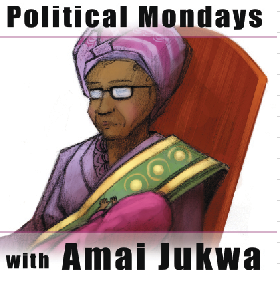Morgan Tsvangirai’s GMO economic vision

sacks of maize-meal on their shoulders at Blue Ribbon have jobs.
The other party, Zanu-PF, speaks of economic empowerment through the leveraging of our natural resources and human capital. It argues that big business invests not as an act of grace but because it seeks a profit. It is not an act of generosity. MDC-T counters this arguing that if we do not ‘behave our nigger selves’ then Western investors will not come.
In an MDC-T Eldorado, large multinational companies would dominate the nation’s economic sphere. Their capital would generate wealth for them and they would contribute by giving our people jobs sticking labels on cigarette packs.
This is a hopelessly unimaginative worldview — this is hardly surprising given that these policies are fashioned by Westerners who stand to gain the most from such a capital-is-king economic system. It is an economic system in which our people are shovels and tractors that are paid slave wages, as was the case during the white farmer komboni days. Tsvangirai looks back to those days with longing.
Contrast this with Robert Mugabe’s vision. In Mugabe’s ideal world, a company must indeed pay wages but the workers must hold 10 percent of its shares and also partake of the wealth that comes from the labour capital they invest in that organisation. The people who are working in mine shafts are a kind of capital and Robert Mugabe recognises this. This is the cost of doing business in Zimbabwe and foreigners must know that. They want the gold, platinum, diamonds and chrome that are abundant in this country and they will soon play ball, Zimplats is still here despite the very clear direction that Zanu-PF’s policies are taking.
The Zanu-PF model goes further with the Community Share Ownership scheme in which foreign owned companies must invest 10 percent of their equity within the local community in which it operates. It can no longer be the case that a foreign company pumps minerals from an area, creams off the profits through clever financial engineering, as done by Associated British Foods in Zambia, pays a pathetic tax bill and then says we are doing Africans a favour by giving them “jobs” lifting bags of maize meal.
I could carry on but this article is not a comparison of manifestos; instead, I want to give a historical context to our economic circumstances and how this should have a bearing on our economic policies.
Organic till saturation
The natural economic order is one in which the individual produces what he needs if he can produce it. Outsourcing should only happen in the event that the subject is unable to produce or has found an agent that can produce it at a lower cost. This is not the reality in Africa because of our colonial legacy. If one permits we could describe our circumstances as an economic short-circuit.
Take eggs for instance. It is outrageous that our people largely rely on supermarkets to supply them with this product. Many cannot afford to purchase the commodity as often as they would like. What is troubling is that they very much have the capacity to produce the product on their own but we have developed a culture in which individuals are stripped of their capacity to produce.
It is for this reason that our people’s tomatoes go to waste every season. They cannot dry them. Our people are unable to pickle. They lack the skill to brew alcohol or to make cheese. Their natural inclination is to purchase these items. One would struggle to find a Zimbabwe who makes their own ketchup despite the abundance of cheap raw materials. The same is true of simple products like marmalade. This would not be a problem if people had the money to buy these products.
We find ourselves in these compromised circumstances primarily because of the impact of colonialism. Our natural economic order was short-circuited and we were pushed into a consumer culture in which we are primarily labourers in service of capital, relying on our wages to purchase of our needs. This model is clearly not working because although industry has a capacity to produce, it seems that this production is at a cost that is higher than what our people can manage if they were to take on the task of production at a domestic level.
I consider costs in monetary and time terms. Both are quite self-evident. We have millions of unemployed youths who cannot afford eggs for breakfast and do not have US$3,50 for a bottle sub-standard marmalade. The land we have in this country is ample, how then is it that we find ourselves in a place where the economic order dictates that the only way one can eat is by surrendering themselves to the dictates of foreign capital? I would hope the madness of all this is apparent to others beside myself.
Back to basics
Morgan Tsvangirai is satisfied with the Komboni Zimbabwe in which people barely eke out a living though they are surrounded by an abundance of resources. His solution is to bring in foreign capital and to take us back to the 1990’s in which people are a paycheck away from poverty and many simply get by — a time in which there was no real wealth.
His vision is of a GMO economy in which economic prosperity is at the mercy of external elements. This is madness.
We need to get back to basics, which translates to nothing other than indigenisation. This means indigenous Zimbabweans must be able to produce. They must be involved in the economy. Until such a time as a foreign actor can locally produce chickens at $1 a bird then I see no reason why we must submit our people to a system in which they are excluded from the means of production when the capacity exists for cheaper production by our people. Give the people land, they have the time to work it, and leverage our minerals deposits (monitise) and use that to stimulate the agricultural sector. Empower the people to produce.
A few weeks back I spoke about the ineffectiveness of our education system, pointing to our inability to develop an education system that impacts upon daily life. Our “educated” people still can’t think themselves out of the inadequate mud hut. The same argument holds as regards economic policy. We do not need foreign investors who come to make cheese and marmalade in Zimbabwe. I would hope the logic of this is obvious.
An ambitious vision
Reading through the Zanu-PF manifesto one cannot help but be captivated by the imagination that went into drafting the policies contained therein. What troubles me is the scale of ambition. It is not so much that what is proposed but Zanu-PF’s capacity to implement.
Zanu-PF’s policies have always been unassailable. The issue is as regards implementation. In this regard Zanu-PF does a miserable job.
I love the policy but remain hesitant as regards implementation.
Ndatenda
Ndini muchembere wenyu Amai Jukwa








Comments